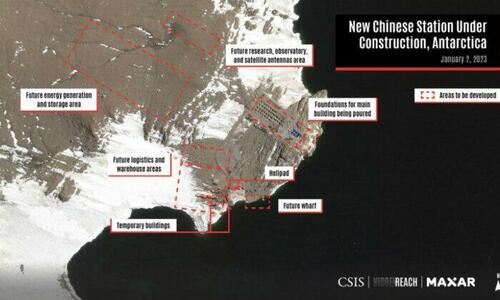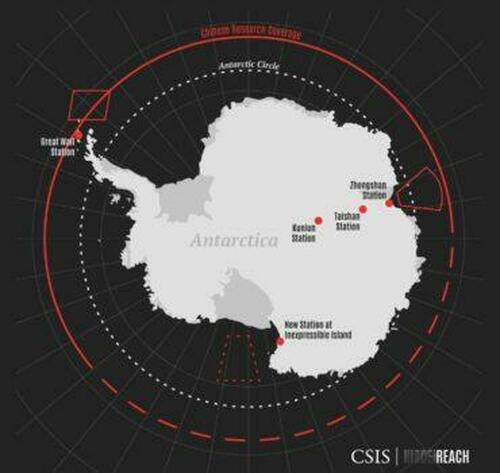
Authored by Daniel Teng via The Epoch Times,
Beijing is embarking on the “most significant” expansion of its footprint in Antarctica after new satellite images revealed the communist regime has resumed construction on a fifth polar station.
A satellite view with overlays shows areas to be developed at the new Chinese station under construction, on Inexpressible Island, Antarctica, January 2, 2023. Center for Strategic and International Studies (CSIS)/Hidden Reach/Maxar Technologies 2023/Handout via REUTERS
The new station, located on Inexpressible Island near the Ross Sea, could double as a spying operation, a Washington-based think tank suggests.
“While essential for tracking and communicating with China’s growing array of scientific satellites, ground stations can support intelligence collection,” the report from the Center for Strategic and International Studies says.
“Importantly, the station’s position may enable it to collect signals intelligence from U.S.-allied Australia and New Zealand and could collect telemetry data on rockets launching from newly established space facilities in both countries.”
The CSIS says China has faced more challenges in establishing a footprint in the northern Arctic and, instead, has a “freer hand” to explore the South Pole.
While the United States still maintains the largest presence on the continent, Beijing’s presence is expanding rapidly. It currently has four stations (all to be expanded), including the Great Wall, Taishan, Kunlun, and Zhongshan stations.
A map shows the locations of existing Chinese Antarctic stations and the Inexpressible Island site of a new station in this handout image. (Center for Strategic and International Studies (CSIS)/Hidden Reach)
“The Zhongshan Station’s assets could be leveraged to collect intelligence on foreign militaries in the Indian Ocean, including on the joint U.S.-UK Naval Support Facility Diego Garcia. It could also play a support role in monitoring India’s developing naval forces operating in the region.”
The Chinese Communist Party (CCP) has maintained that its frequent expeditions to Antarctica are for research purposes only.
However, the U.S. Department of Defense has said the CCP’s strategy is to develop “dual-use technologies, facilities, and scientific research,” all aimed at improving the capabilities of the Chinese People’s Liberation Army.
These research stations could also be reference positions for Beijing’s answer to the U.S.-run global positioning system, the BeiDou satellite network.
“There’s absolutely no reason why Antarctica would be immune from this doctrine,” Anthony Bergin, senior fellow at the Australian Strategic Policy Institute, previously told The Epoch Times.
“Particular technologies, particular pieces of scientific research, could be morphed into part of a bigger system. It’s not so much we would expect a direct military threat from Antarctica.”
Antarctic Treaties Under Threat
The Antarctic Treaty System, established in 1961, is a key agreement governing international relations on the continent. The treaty is considered one of the most “successful sets of international agreements” because it has relied on goodwill and peaceful cooperation between nations.
Since the CCP ratified the treaty in 1983, it has been steadily expanding its footprint, fishing fleets, and research expeditions to the continent.
Beijing’s role in Antarctica’s affairs also has been contentious on other fronts.
In 2022, Russia and China again blocked a proposal to establish a new conservation zone in the area during a Conservation of Antarctic Marine Living Resources (CCAMLR) meeting. This was the sixth consecutive year that such a proposal had been blocked by either party.
“It’s this weird politicization of science,” Tony Press, a former CCAMLR commissioner, said in an interview with Scientific American.
“Frankly, it is now holding back progress,” the U.S. delegation to the CCAMLR meeting said in an opening statement. “Countries that have prioritized their individual needs have weakened our ability to meet the shared conservation objectives on which this body was founded.”
Authored by Daniel Teng via The Epoch Times,
Beijing is embarking on the “most significant” expansion of its footprint in Antarctica after new satellite images revealed the communist regime has resumed construction on a fifth polar station.
A satellite view with overlays shows areas to be developed at the new Chinese station under construction, on Inexpressible Island, Antarctica, January 2, 2023. Center for Strategic and International Studies (CSIS)/Hidden Reach/Maxar Technologies 2023/Handout via REUTERS
The new station, located on Inexpressible Island near the Ross Sea, could double as a spying operation, a Washington-based think tank suggests.
“While essential for tracking and communicating with China’s growing array of scientific satellites, ground stations can support intelligence collection,” the report from the Center for Strategic and International Studies says.
“Importantly, the station’s position may enable it to collect signals intelligence from U.S.-allied Australia and New Zealand and could collect telemetry data on rockets launching from newly established space facilities in both countries.”
The CSIS says China has faced more challenges in establishing a footprint in the northern Arctic and, instead, has a “freer hand” to explore the South Pole.
While the United States still maintains the largest presence on the continent, Beijing’s presence is expanding rapidly. It currently has four stations (all to be expanded), including the Great Wall, Taishan, Kunlun, and Zhongshan stations.
A map shows the locations of existing Chinese Antarctic stations and the Inexpressible Island site of a new station in this handout image. (Center for Strategic and International Studies (CSIS)/Hidden Reach)
“The Zhongshan Station’s assets could be leveraged to collect intelligence on foreign militaries in the Indian Ocean, including on the joint U.S.-UK Naval Support Facility Diego Garcia. It could also play a support role in monitoring India’s developing naval forces operating in the region.”
The Chinese Communist Party (CCP) has maintained that its frequent expeditions to Antarctica are for research purposes only.
However, the U.S. Department of Defense has said the CCP’s strategy is to develop “dual-use technologies, facilities, and scientific research,” all aimed at improving the capabilities of the Chinese People’s Liberation Army.
These research stations could also be reference positions for Beijing’s answer to the U.S.-run global positioning system, the BeiDou satellite network.
“There’s absolutely no reason why Antarctica would be immune from this doctrine,” Anthony Bergin, senior fellow at the Australian Strategic Policy Institute, previously told The Epoch Times.
“Particular technologies, particular pieces of scientific research, could be morphed into part of a bigger system. It’s not so much we would expect a direct military threat from Antarctica.”
Antarctic Treaties Under Threat
The Antarctic Treaty System, established in 1961, is a key agreement governing international relations on the continent. The treaty is considered one of the most “successful sets of international agreements” because it has relied on goodwill and peaceful cooperation between nations.
Since the CCP ratified the treaty in 1983, it has been steadily expanding its footprint, fishing fleets, and research expeditions to the continent.
Beijing’s role in Antarctica’s affairs also has been contentious on other fronts.
In 2022, Russia and China again blocked a proposal to establish a new conservation zone in the area during a Conservation of Antarctic Marine Living Resources (CCAMLR) meeting. This was the sixth consecutive year that such a proposal had been blocked by either party.
“It’s this weird politicization of science,” Tony Press, a former CCAMLR commissioner, said in an interview with Scientific American.
“Frankly, it is now holding back progress,” the U.S. delegation to the CCAMLR meeting said in an opening statement. “Countries that have prioritized their individual needs have weakened our ability to meet the shared conservation objectives on which this body was founded.”
Loading…






